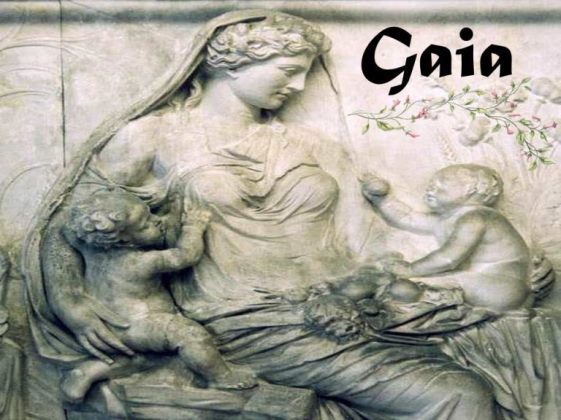Gaea (Gaia) Rustic goddesse

Gaea was the Ancient Greek personification of the Earth, and, for all intents and purposes, the Mother of Everything Beautiful in the world. Born spontaneously – either out of Nothingness or out of Chaos – Gaea brought forth (among others) Uranus, with whom she subsequently mated to give birth to the Titans, themselves parents of most of the Olympians. Gaea rebelled against the reigns of all three rulers of the universe (Uranus, Cronus, Zeus), but, ultimately, she had to accept her grandson Zeus as the supreme king of all gods and men.
Gaea’s Birth
Gaea (the Earth), “the ever-sure foundation of all the deathless ones who hold the peaks of snowy Olympus,” was the first deity to be born after Chaos, the gaping emptiness, came into being. She was followed by Tartarus (the Underworld) and Eros (Love). Some believe that these three were, in fact, all children of the dark primeval void, but, most probably, they belonged to the same – the very first – generation of gods.
Gaea’s First Children
Without a mate, Gaea brought forth three children: Uranus (the Sky), Ourea (the Mountains), and Pontus (the Sea).
First, she lay with her oldest son, Uranus, and gave birth to eighteen children. The first twelve of them were the Titans: six females (Theia, Rhea, Themis, Mnemosyne, Phoebe, Tethys), and six males (Oceanus, Coeus, Crius, Hyperion, Iapetus, and Cronus). Next, she bore the three Cyclopes (Brontes, Steropes, and Arges), and, finally, the three Hecatoncheires (Cottus, Briareos, and Gyges).
Afterward, Gaea mated with Pontus and brought into being five more children: Nereus, Thaumas, Phorcys, Ceto, and Eurybia.

Gaea vs. Uranus
Though lustful and unrestrained, Uranus, the Sky, hated his children; so much so, in fact, that he pushed each of them back into the Earth (the womb of their mother) at the very moment of birth. After a while, devastated by grief and pain, Gaea fashioned an adamantine sickle and asked her children to help her oust Uranus from power.
Gaea vs. Cronus
The Titanomachy
After a brief period of harmony and bliss, Cronus started ruling the world the same way his father had ruled it before him: brutally and autocratically. Alarmed by a prophecy and fearing a rebellion, he imprisoned his brothers, the Cyclopes and the Hecatoncheires, in Tartarus, and swallowed all but the youngest of his six children. The child – who will grow to become Zeus – was saved thanks to the shrewd advice which Gaea gave to Rhea, Cronus’ wife: to replace it with a stone.
However, even after successfully freeing his brothers and his sisters, Zeus was unable to overthrow Cronus – at least not until Gaea advised him to free the Cyclopes and the Hecatoncheires from Tartarus and form an alliance with them. This did the trick: after ten years, the Olympians finally won the war against the Titans (the Titanomachy), and Zeus became the third ruler of the gods.
Gaea vs. Zeus
Zeus’ supreme power was challenged several times; the most serious two of these challenges were orchestrated by his grandmother, Gaea.
Even at his tyrannical worst, Zeus was a far better ruler than his predecessors; however, this mattered not in the slightest to Gaea, since Zeus too dared to imprison some of her children. In his case, naturally, the prisoners were the Titans, left to rot away in Tartarus.
Consequently, Gaea summoned the best of the rest, the Gigantes, and commanded them to get rid of Zeus. That’s how the Gigantomachy started, a war which lasted for a long period, but which, nevertheless, ended with the Olympians prevailing and Zeus cementing his power.